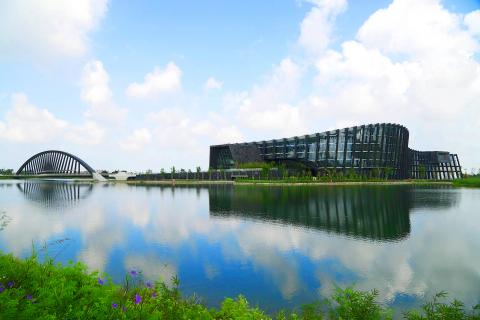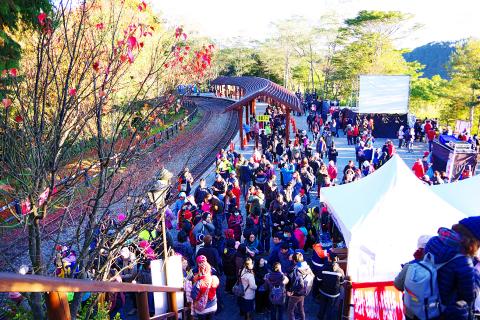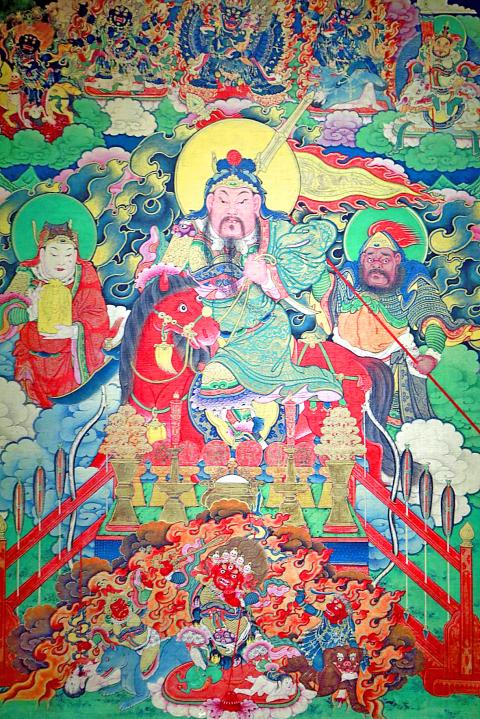When Chris Nelson arrived at the entrance to Alishan National Forest Recreation Area (阿里山國家森林遊樂區) in April 2017, he had an unpleasant surprise. The Californian and his wife approached the ticket gate where, he says, “the staff heard her accent and assumed she was from Taiwan, and saw my face and assumed I was a foreigner. They didn’t check our IDs, but were right in both cases. My wife paid the local rate, and I paid the foreigner rate. I immediately felt it was unfair.”
Taiwan nationals pay NT$200 to enter the recreation area, while non-Taiwanese are charged NT$300. The differential extends to children aged 7 to 12 and those carrying student ID — locals pay NT$100, but for foreigners, admission costs NT$150.
“I’m opposed to double pricing as a matter of principle,” says Nelson, a translator who’s lived in Taipei on and off for close to three decades. “It’s something I associate with countries known for cheating outsiders, like China. Dual-pricing is unbecoming of Taiwan.”

Photo: Tsai Tsong-hsun, Taipei Times
Richard Saunders, a former Taipei Times contributor who moved back to his native England last year, expressed fury when he heard about Alishan’s pricing policy.
“No! That’s really bad news. I’ve come across double-pricing in China and Guatemala, and each time it enraged me,” he says.
WEALTHY FOREIGNERS

Photo courtesy of Chiayi County Government
Saunders objects to different admission charges because “they emphasize that you’re a foreigner, and supposedly richer, which isn’t necessarily true. Also — and this is what makes me really angry — it often feels like a quasi-political stunt, with the authorities trying to impress short-sighted locals by showing them ‘look, we’re charging foreigners more because this is your country, and they can afford it.’”
In early 2012, Saunders and others (among them this writer) lobbied the Tourism Bureau to pressure Yushan National Park to reverse a plan that foreigners climbing Jade Mountain (玉山) would have to pay NT$700 to stay in Paiyun Lodge (排雲山莊), while local citizens would be charged only NT$220. The proposal was dropped in October that year. All hikers now pay NT$480 per person.
Among Taiwanese, the idea of charging foreign visitors more than local people enjoys some support — even when the shoe is on the other foot.

Photo: Tsai Tsong-hsun, Taipei Times
“I don’t mind paying more than locals when I go to other countries,” says Chen I-ping (陳逸蘋). “Many attractions are run by the government and funded by taxes. The government should encourage its citizens to visit museums and national parks, so they can know more about Taiwan’s culture and nature. Giving local people free or inexpensive admission is the best way to encourage locals to go to those places,” says the well-traveled Tainan native. “It’s good for people’s welfare. I think extra charges for foreigners are reasonable, but I don’t support charging tourists vastly more, like they do in Sri Lanka.”
The Forestry Bureau’s Web site reflects similar thinking. The bureau is the central government unit responsible for managing Alishan National Forest Recreation Area. Noting that the number of visitors entering the area tripled between 2010 and 2015, with foreigners accounting for most of the growth, a 2016 Web page announcing higher ticket prices said Taiwanese nationals would be exempted from the price hike, “to encourage people to get closer to nature.”
Hsu Shih-yun (許世芸), an associate professor in the Department of Leisure and Recreation Management at Asia University, has encountered two-tier pricing in Hawaii.
Hsu cites as an example the entrance fee for Hanauma Bay Nature Preserve, which is US$7.50; locals with state ID pay nothing.
At the same time, Hsu says she understands how different prices could cause resentment.
“If I were a foreigner, and I saw one price for Taiwanese, and a higher price for foreigners, I wouldn’t be happy. I would feel I’m being discriminated against. But if it listed a regular price for everyone, and then a discount for people carrying proof of residence — or students, or old people — I’d feel better. If I don’t qualify, I’d know the discount doesn’t apply to me.”
Some of Taiwan’s local governments already do this. Tainan residents can enter attractions including Fort Zeelandia (安平古堡) and the city’s Confucius Temple (孔廟) for free. Outsiders pay up to NT$50.
“I think ‘non-residents,’ not ‘non-Taiwanese,’ should pay more than residents. Foreigners living in Taiwan have to pay tax, so they should also enjoy the pricing benefits,” Hsu says. “We can copy the way it’s done in New Zealand, where I lived when pursuing my PhD. I wasn’t even a taxpayer, but Auckland Museum allowed free entry for people with proof of residence, such as a utility bill or library card.”
According to Hsu, very little research has been done on how differential pricing would impact tourism in Taiwan, but she points to a 2017 study that found Chinese tourists were more willing to pay higher prices to enter the Former British Consulate at Takow (打狗英國領事館文化園區) compared to Taiwanese visitors, and that (according to the study’s abstract), “raising the ticket price under high-quality management conditions will not deter Chinese tourists.”
HARMING TOURISM?
Hsu says her students are divided on this issue. Some say foreigners should pay more than locals, but others are concerned that two-tier pricing would harm inbound tourism.
Saunders strongly agrees with the latter point of view.
“The authorities are really shooting themselves in the foot if they allow this ridiculous principle to creep in,” he says.
It’s already creeping in. Admission to the National Palace Museum is now NT$350 for foreign tourists over the age of 18. Taiwanese and foreigners holding alien permanent resident certificates pay NT$150.
The Forestry Bureau, responding to emailed questions, stated: “Because Alishan is an internationally famous scenic spot, we chose the area as a trial for ‘two-tier’ prices. We will review the trial results and consider whether to introduce ‘two-tier’ prices at other recreation areas.”
Asked why they decided to charge foreigners more than Taiwanese, the bureau said: “The price adjustment was based on cumulative cost data from 2010 to 2014, and the number of tourists. The calculated cost of service for each tourist is approximately NT$230.”
The forest area’s functions go beyond leisure to include ecological conservation, land security and water conservation, the bureau explained, adding that non-recreation costs are met by the national budget.
Asked about the fairness of foreign citizens who live and pay taxes in Taiwan being charged more for admission than Taiwanese, the bureau highlighted the need to “set up multimedia guide machines which can display seven different languages and multi-language commentaries, publish multilingual leaflets, buy multilingual translation machines and [train volunteers in] foreign languages.”
The impact of the bureau’s ticket policy is hard to disentangle from other factors. Nelson and Saunders likely aren’t the only non-Taiwanese put off by two-tier pricing, and it’s true, according to the Forestry Bureau, that the number of foreign tourists entering the forest recreation area (which in recent years varied from 34 percent to 48 percent of the total) has fallen since 2016. In particular, Chinese tourists — many of whom regard Alishan as a “must see” — aren’t as numerous as a few years ago. The main reason for declining foreign-visitor numbers is probably Beijing’s political manipulation of outbound tourism, rather than any perception of unfairness.
Still, for travelers like Saunders, the countryside should belong to everyone and the authorities of each country havea responsibility to preserve natural heritage for everyone.
“They’re caretakers, not owners,” Saunders says. “No country, Taiwan included, has a moral right to even imply that its citizens have a greater right to enjoy its natural and cultural treasures than foreign visitors. Yet, by introducing a two-tier admission system, that’s the implication they’re making.”

The primaries for this year’s nine-in-one local elections in November began early in this election cycle, starting last autumn. The local press has been full of tales of intrigue, betrayal, infighting and drama going back to the summer of 2024. This is not widely covered in the English-language press, and the nine-in-one elections are not well understood. The nine-in-one elections refer to the nine levels of local governments that go to the ballot, from the neighborhood and village borough chief level on up to the city mayor and county commissioner level. The main focus is on the 22 special municipality

The People’s Republic of China (PRC) invaded Vietnam in 1979, following a year of increasingly tense relations between the two states. Beijing viewed Vietnam’s close relations with Soviet Russia as a threat. One of the pretexts it used was the alleged mistreatment of the ethnic Chinese in Vietnam. Tension between the ethnic Chinese and governments in Vietnam had been ongoing for decades. The French used to play off the Vietnamese against the Chinese as a divide-and-rule strategy. The Saigon government in 1956 compelled all Vietnam-born Chinese to adopt Vietnamese citizenship. It also banned them from 11 trades they had previously

In the 2010s, the Communist Party of China (CCP) began cracking down on Christian churches. Media reports said at the time that various versions of Protestant Christianity were likely the fastest growing religions in the People’s Republic of China (PRC). The crackdown was part of a campaign that in turn was part of a larger movement to bring religion under party control. For the Protestant churches, “the government’s aim has been to force all churches into the state-controlled organization,” according to a 2023 article in Christianity Today. That piece was centered on Wang Yi (王怡), the fiery, charismatic pastor of the

Hsu Pu-liao (許不了) never lived to see the premiere of his most successful film, The Clown and the Swan (小丑與天鵝, 1985). The movie, which starred Hsu, the “Taiwanese Charlie Chaplin,” outgrossed Jackie Chan’s Heart of Dragon (龍的心), earning NT$9.2 million at the local box office. Forty years after its premiere, the film has become the Taiwan Film and Audiovisual Institute’s (TFAI) 100th restoration. “It is the only one of Hsu’s films whose original negative survived,” says director Kevin Chu (朱延平), one of Taiwan’s most commercially successful